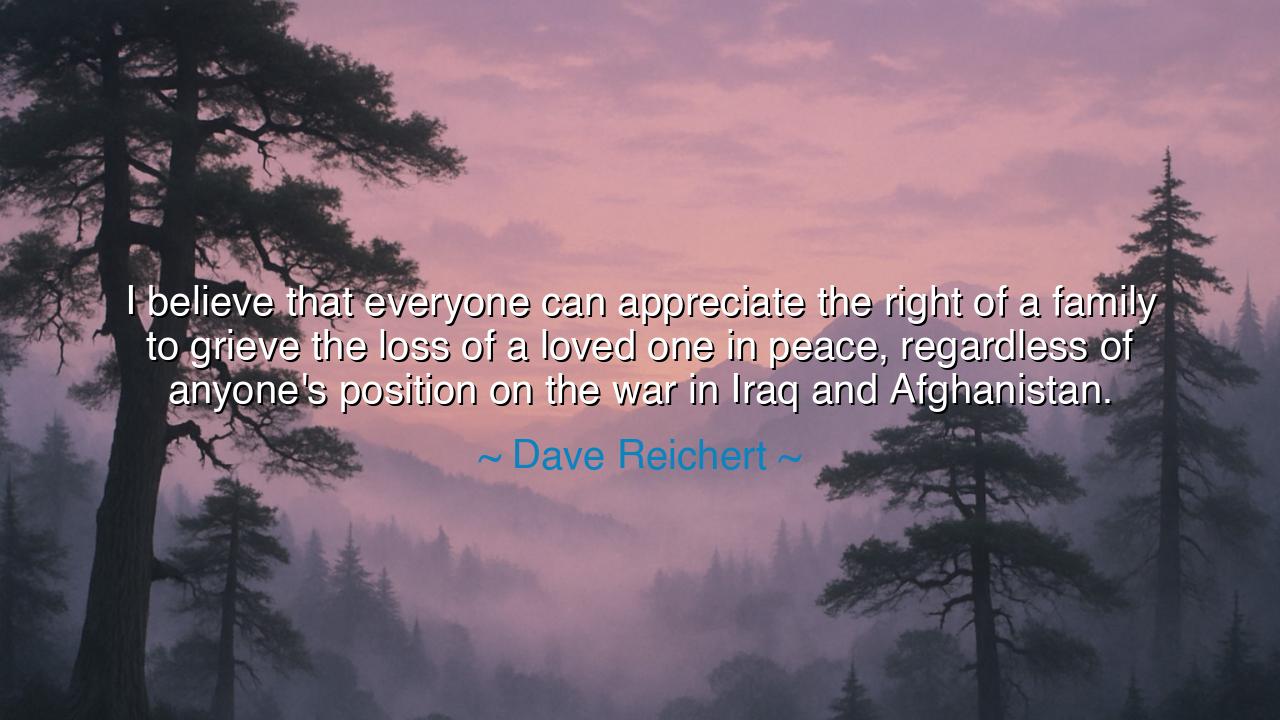
I believe that everyone can appreciate the right of a family to
I believe that everyone can appreciate the right of a family to grieve the loss of a loved one in peace, regardless of anyone's position on the war in Iraq and Afghanistan.






Hear now the words of Dave Reichert, spoken with gravity and compassion: “I believe that everyone can appreciate the right of a family to grieve the loss of a loved one in peace, regardless of anyone's position on the war in Iraq and Afghanistan.” These words ring with the timeless truth that beyond the banners of nations, beyond the clashing of swords and the cries of politics, lies the sacred bond of the human heart. For in death, all divisions fall silent, and in grief, all families are equal.
From the dawn of time, men have waged war—for land, for honor, for faith, for power. Yet even as armies marched and empires rose, there remained a place where strife could not intrude: the mourning of those left behind. In the tents of the Greeks after Troy, in the ashes of Carthage, in the fields of Gettysburg, mothers and fathers bent their heads in sorrow, their tears no different from one age to another. Reichert’s words call us back to this eternal truth: that no matter the cause or the quarrel, the family has the right to grieve in peace.
Consider the tale of Pericles of Athens, who in his famous funeral oration spoke of the glory of the fallen. Yet even in the midst of praise, he acknowledged the silent sorrow of those who gave sons and husbands to the earth. The city might honor the sacrifice, but the hearth felt the wound. And so too in our own day, as the conflicts in Iraq and Afghanistan claimed countless lives, the pain of the loved ones left behind transcended all debates over policy or justice. Their mourning was not for politics, but for the empty chair, the silent voice, the beloved gone.
Reichert’s words also carry a rebuke against the clamor of the world, which too often intrudes even upon grief. In times of war, men argue, protest, justify, condemn. Yet he reminds us that there is a boundary which must not be crossed: the mourning of a family. To disturb it is to dishonor the dead and wound the living. Just as the ancients set aside sacred groves where no weapon could be raised, so too should we guard the sanctity of grief, where politics cannot trespass.
There is wisdom here, O seeker. For grief is the great equalizer; it makes kings as frail as beggars, and warriors as tender as children. To respect another’s mourning is to recognize the shared humanity that lies beneath all strife. When we honor the family in their sorrow, we affirm that even in conflict, compassion endures, and even in division, we remain bound together by the cords of love and loss.
The lesson, then, is clear: when you encounter grief, set aside your arguments, your judgments, your causes. Offer silence, compassion, and presence. Do not use another’s sorrow as a battlefield for your beliefs, but let it be a sanctuary. For in that sacred space, the true measure of humanity is revealed—not in victory or defeat, but in the tenderness we show one another when hearts are broken.
Therefore, O traveler of life, let Reichert’s words be a shield around your own dealings with others. Respect the tears of strangers as though they were your own. Stand guard over the mourning, as the ancients stood guard over the tombs of heroes. For though wars shall rage and politics shall divide, the right to grieve in peace is eternal and inviolable.
So remember: nations may argue, leaders may falter, causes may clash—but the sorrow of a family belongs to no faction, no banner, no creed. It belongs to the human soul itself. Honor it, and in honoring it, you will walk the path of compassion that binds all generations.






AAdministratorAdministrator
Welcome, honored guests. Please leave a comment, we will respond soon